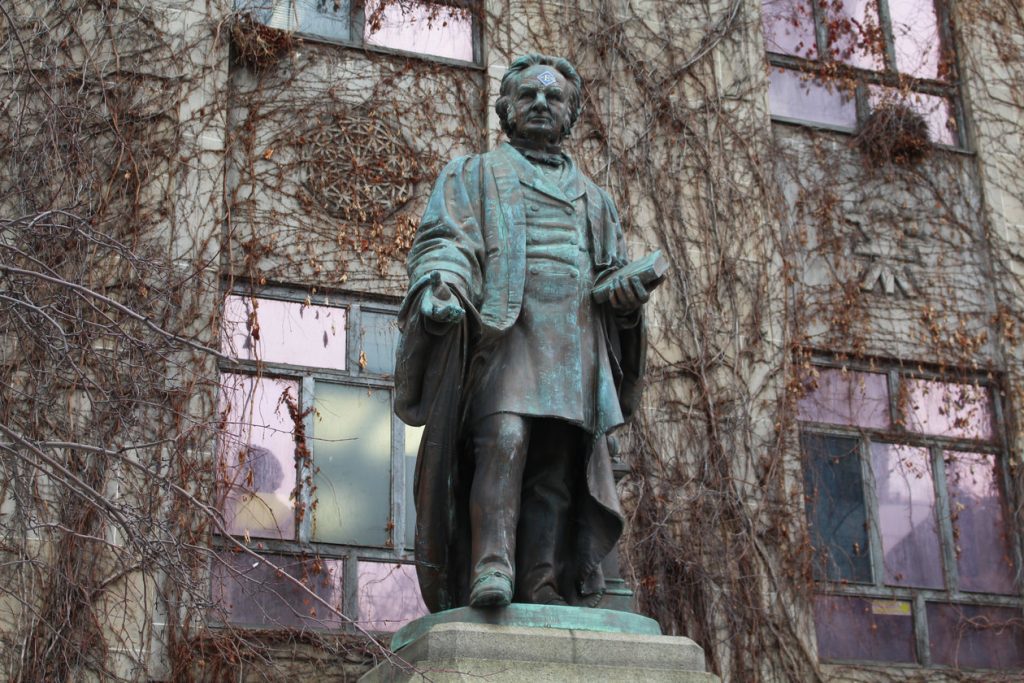
A First Nations student and an Inuk advocate voiced their concerns over the Ryerson Students’ Union’s (RSU) lack of action towards the statue of Egerton Ryerson and the university’s name change. Both called on the union to consider the issue from Indigenous students’ perspectives.
Salina Nichols, an Ojibwa student at Ryerson, said that the RSU is not doing enough to advocate for the statue to be taken down, nor is it calling frequently enough for the university to change its name.
Egerton Ryerson was a key architect for residential schools, which stripped Indigenous children from their lands and their homes. The National Centre for Truth and Reconciliation compiled a list of 4,118 names of children that died in residential schools across the country. It is thought that many more have died, uncounted and unnamed.
“There are no words to describe the pain and trauma that we are left now,” Nichols said in an interview with the Ryersonian. “Our culture and language are lost and now we have to fight to keep them alive. And yet, the RSU still doesn’t want to take down the statue or change the name.”
For Nichols, the RSU’s silence seems like it is trying to dismiss the issue so it doesn’t cause conflict on campus. It’s unfair that Indigenous students have to be constantly reminded of the trauma of residential schools, she said. It’s also unfair that Indigenous students have to struggle to keep their cultures and languages alive today.
“I want them to try to think of this issue from an Indigenous perspective and think about how they would feel if they had to attend a school with the name of a man who helped create a system that killed your relatives,” said Nichols. “I hope the RSU at least educates themselves more on the history of Indigenous people and makes the change to work towards reconciliation.”
Inuk advocate is also concerned about the RSU’s silence
The RSU’s silence towards issues such as the Ryerson statue and the university name change also hurts Indigenous peoples off-campus. Angela Rheaume is an Inuk who was born and raised in Yellowknife. She said her story is significantly different compared to a First Nations person from a reserve.
Rheaume also said that the RSU’s silence towards the Ryerson statue is unfortunate.
“Indigenous students’ voices deserve to be heard. It is a complicated situation because to us and those who understand it, it is more than just some statue; it is a lot deeper than that,” said Rheaume.
Rheaume echoed Nichols’s concerns about the RSU sending a message that they don’t care about Indigenous students on campus. Rheaume urged the union’s executives to imagine themselves in an Indigenous person’s shoes.
“The system separated and broke thousands of families, creating generations of trauma… it’s more than just a statue,” she said.
Inuit students at Ryerson should work with other Indigenous students and people of colour to advocate for their voices to be heard, Rheaume said, adding that more voices can lead to a stronger impact on campus.
“I think with these days, the best way to get your voice out is through different avenues of social media. The internet can be seen all over the world and all it takes is one post and word can spread,” Rheaume said.
CESAR’s letter demanding the removal of the statue
The RSU is not listed as an organization that signed the Continuing Education Students’ Association of Ryerson’s (CESAR) open letter to remove the Ryerson statue on campus. The letter was published on July 24 after three Black Lives Matter activists were arrested for painting the statue in protest. More than 1,200 Ryerson students, faculty and staff have signed the letter to date. Only one executive and five directors from the RSU have signed the letter to date.
“The RSU has a clear mandate of representing 40,000 of its members on campus… I have to be sure that this is what most of our membership wants us to pursue. Looking at the number of students that have signed the letter so far, it’s barely two per cent of the RSU’s membership,” RSU president Ali Yousaf said in an email to the Ryersonian.
Yousaf also said that he will speak with the executive team to see if they can support CESAR differently. Maddy Fast, CESAR’s vice-president of equity and campaigns, said that the current RSU leadership has not engaged with CESAR. She said that the RSU has not been engaged with social justice activism, even though CESAR tries to involve the RSU in these efforts.
“It really isn’t about the RSU leadership. It’s about the students that are represented. It’s our jobs as student representatives to meet that level of engagement and to show solidarity and to show that we’re listening,” said Fast.
Fast said students can amplify their voices by emailing representatives, calling their offices and showing up to board meetings. Fast said she encourages students to ask questions to make sure that issues that need to be addressed are heard.
“I just really think we have the responsibility to listen and to make sure that students know that we’re listening, and if students don’t know that we’re listening then they need to exercise their democratic rights,” Fast said. “It’s really up to them to hold their student representatives accountable.”
